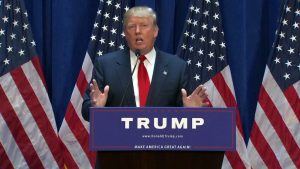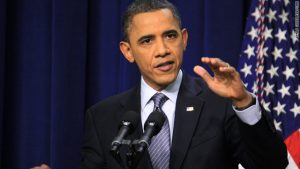In a presidential election year unlike any other, featuring two controversial candidates who present strong personalities and evoke strong opinions from the public, we may see yet another remarkable deviation from traditional campaign politics.
Party platforms typically have no impact on campaign trends once the party conventions are over. But this is 2016 and we have learned that this year anything is possible.
As is the case every four years, the media currently is focused intently on potential vice presidential picks by Donald Trump and Hillary Clinton. But in an election where voters are judging the Republican and Democratic party nominees almost entirely on personal traits, it seems unimaginable that the running mates will be much more than a sideshow in 2016.
Instead, in a volatile race where policy proposals barely scratch the surface, particularly on the Republican side with Trump offering minimal details, the two parties’ platforms may play a major role in the campaign to come. The platforms could offer the only substance on which to mount a comparative liberal vs. conservative race for the White House.

The unity event between Clinton and her primary foe, Sen. Bernie Sanders, taking place this morning was made possible by the presumptive Democratic nominee’s willingness to adopt much of Sanders’ left-wing agenda. The Clinton team was so pliable, so eager to get the party’s Sanders supporters on board before the Philadelphia convention, that they were shoved leftward in a way that could not have been imagined when the Vermont senator began his presidential bid.
The stunning stances on issues in the Democratic National Committee platform produced this weekend in Orlando include carbon taxes, police reform, new forms of abortion rights, the minimum wage and the war on drugs. And the changes that came out of this so-called platform fight barely drew any opposition. A $15 minimum wage, free college tuition, a “pathway” to marijuana legalization, the first steps toward universal health care – these are declarations that would have had no chance of approval as recently as 2004, when the Democrats had their sights set on defeating Republican President George W. Bush.
“We have produced by far the most progressive platform that this party has seen in multiple generations,” said Connecticut Gov. Dan Malloy, DNC platform committee co-chair.
A key Sanders strategist, praising the senator’s refusal to quickly fold his tent in June, offered this conclusion: “… the political revolution is alive and kicking.”
Well-organized Sanders backers inflamed with anti-Clinton sentiments used their leverage to steer the committee in their democratic socialist direction, knowing that middle-of-the-road Democrats would play no role.
At this point, the Democratic Party, based on its platform, has veered decidedly to the left of President Obama. Even on issues where dreams of congressional approval is the stuff of unicorns and fairy dust, the Dems have so ardently pursued such ultraliberal positions as to put the party noticeably outside of the mainstream.

In contrast, the Democratic platform, while setting aside Sanders’ call for a single payer, government-run health care system for all, embraces an Obamacare public option for all and Medicare for those 55 and over. Clinton had already been nudged into that position on the campaign trail by Sanders’ full-throated support for an end to private insurance.
It’s become obvious in recent months and days that a different Democratic nominee, one without Clinton’s baggage and her lack-of-trust issues, could be winning this race against Trump by a very big margin. Yet, the highly ideological Dem platform shuns caution and provides the GOP another breath of life as it gives moderates and independents a distinct reason to give Trump a second look.
Imagine if the Dems instead nominated a candidate that emphasized a realistic, feasible political agenda and “the importance of pragmatism in both legislation and implementation.”
What if the party had a standardbearer who rejected fringe elements on the right and left and, for example, on health care reform said something like this:
“Simpler approaches to addressing our health care problems exist at both ends of the political spectrum: the single-payer model vs. government vouchers for all. Yet the nation typically reaches its greatest heights when we find common ground between the public and private good and adjust along the way.”
Well, the man who said those things is Obama, and he is ineligible to run again. Though if he could and did seek another term, I suspect the Sanders crusaders would remain in their same obstinate mode. And they would probably be labeling a president beloved by most Democrats a “sellout.”
Photos: CNN




I support hillary.